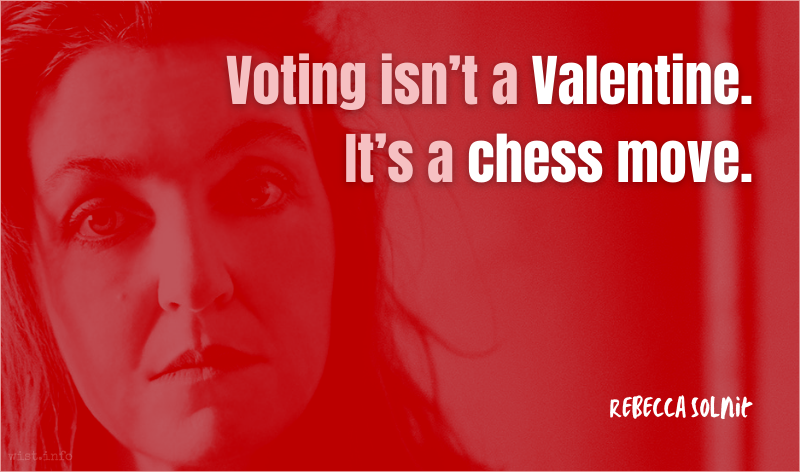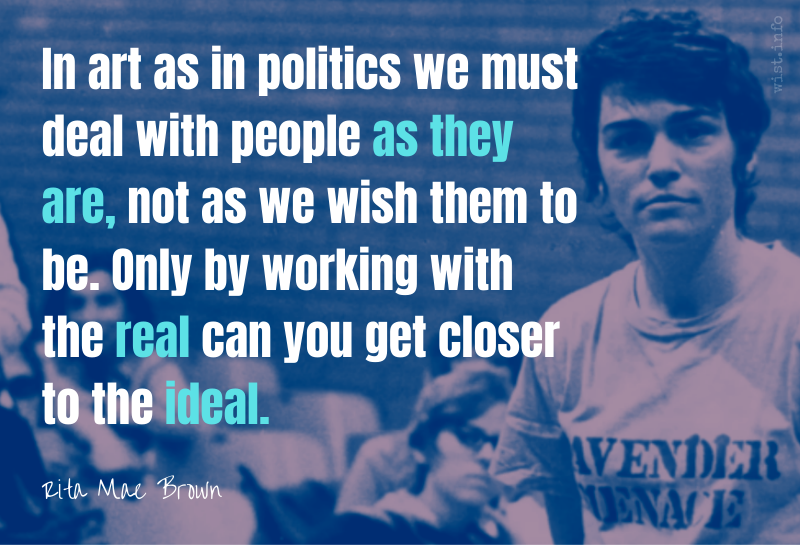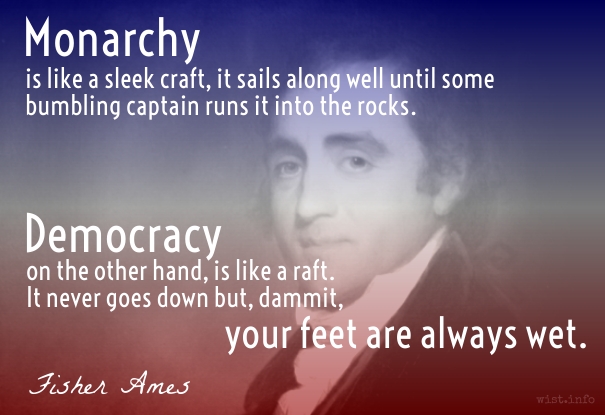The true rule, in determining to embrace, or reject any thing, is not whether it have any evil in it; but whether it have more of evil, than of good. There are few things wholly evil, or wholly good. Almost every thing, especially of governmental policy, is an inseparable compound of the two; so that our best judgment of the preponderance between them is continually demanded.
Abraham Lincoln (1809-1865) American lawyer, politician, US President (1861-65)
Speech (1848-06-20), On Internal Improvements, US House of Representatives
(Source)
Quotations about:
compromise
Note not all quotations have been tagged, so Search may find additional quotes on this topic.
Of course one does meet brilliant men, but they are isolated. The fashion nowadays is all for groups and societies of every sort. — It is always a sign of mediocrity in people when they herd together, whether their group loyalty is to Solovyev or to Kant or Marx. The truth is only sought by individuals, and they break with those who do not love it enough.
Boris Pasternak (1890-1960) Russian poet, novelist, and literary translator
Doctor Zhivago [До́ктор Жива́го], Part 1, ch. 1 “The Five-O’Clock Express,” sec. 4 [Nikolai Nikolaievich] (1955) [tr. Hayward & Harari (1958), UK ed.]
(Source)
Alternate translations:
Yes, there are gifted men, but the fashion nowadays is all for groups and societies of every sort. Gregariousness is always the refuge of mediocrities, whether they swear by Solovyiëv or Kant or Marx. Only individuals seek the truth, and they shun those whose sole concern is not the truth.
[tr. Hayward & Harari (1958), US ed.]
You come across talented people. But now various circles and associations are the fashion. Every herd is a refuge for giftlessness, whether it's a faith in Soloviev, or Kant, or Marx. Only the solitary seek the truth, and they break with all those who don't love it sufficiently.
[tr. Pevear & Volokhonsky (2010)]
COMPROMISE, n. Such an adjustment of conflicting interests as gives each adversary the satisfaction of thinking he has got what he ought not to have, and is deprived of nothing except what was justly his due.
Ambrose Bierce (1842-1914?) American writer and journalist
“Compromise,” The Cynic’s Word Book (1906)
(Source)
Included in The Devil's Dictionary (1911). Originally published in the "Devil's Dictionary" column in the San Francisco Wasp (1881-08-12).
The condition of our survival in any but the meagerest existence is our willingness to accommodate ourselves to the conflicting interests of others, to learn to live in a social world.
Learned Hand (1872-1961) American jurist
“To Yale Law Graduates,” speech, Yale Law School (1931-06-07)
(Source)
Collected in The Spirit of Liberty (1953).
Some joys, it’s true, are wrong in Heaven’s eyes;
Yet Heaven is not averse to compromise.[Le ciel défend, de vrai, certains contentements;
Mais on trouve avec lui des accommodements.]Molière (1622-1673) French playwright, actor [stage name for Jean-Baptiste Poquelin]
Tartuffe, Act 4, sc. 5 [Tartuffe to Elmire] (1664) [tr. Wilbur (1961)]
(Source)
Moliere inserts a note in this line, "A scoundrel is speaking [C’est un scélérat qui parle.]"
(Source (French)). Alternate translations:
Heaven, it is true, forbids certain gratifications, but there are ways and means of compounding such matters.
[tr. Van Laun (c. 1870)]
Heaven, it is true, forbids certain gratifications; but there are ways of compounding these matters.
[tr. Mathew (1890)]
Heaven forbids, 't is true, some satisfactions;
But we find means to make things right with Heaven.
[tr. Page (1909)]
It's true that heaven forbids some satisfactions,
But there are possible ways to understandings.
[tr. Bishop (1957)]
It's true, there are some pleasures Heaven denies;
But there are ways to reach a compromise.
[tr. Frame (1967)]
It's true that Heaven forbids certain pleasures,
but it's possible to make bargains.
[tr. Steiner (2008)]
Heaven forbids, in truth, certain contentments;
But we find with him accomodations.
[Source]
It's true Heaven forbids some pleasures, but a compromise can usually be found.
[E.g.]
I have known nearly all the famous men of our age and I have seen them made wretched by this glorious passion for fame, and die after debauching their moral natures in its service.
[J’ai connu presque tous les hommes célèbres de notre tems, et que je les ai vus malheureux par cette belle passion de célébrité, et mourir, après avoir dégradé par elle leur caractère moral.]Nicolas Chamfort (1741-1794) French writer, epigrammist (b. Nicolas-Sébastien Roch)
Products of Perfected Civilization [Produits de la Civilisation Perfectionée], Part 1 “Maxims and Thoughts [Maximes et Pensées],” “Question” (1795) [tr. Merwin (1969)]
(Source)
(Source (French)). Alternate translation:
I have known nearly every famous man in our times, and I have seen them unhappy through this pretty passion for celebrity, and die after having degraded their moral character for it.
[tr. Siniscalchi (1994)]
Historians may be dogmatists, I know, though not so often now as when history was dogma. At least you will perhaps agree that even a smattering of history and especially of letters will go far to dull the edges of uncompromising conviction. No doubt one may quote history to support any cause, as the devil quotes scripture; but modern history is not a very satisfactory side-arm in political polemics; it grows less and less so.
Learned Hand (1872-1961) American jurist
“Sources of Tolerance,” speech, University of Pennsylvania Law School (1930-06)
(Source)
Collected in The Spirit of Liberty (1953).
Moral compromises don’t stop happening even when everyone involved is trying to do the right thing.
Elizabeth Bear (b. 1971) American author [pseud. for Sarah Bear Elizabeth Wishnevsky]
Ancestral Night (2009)
(Source)
Freedom is more precious than any gifts for which you may be tempted to give it up.
[Más preciosa es la libertad que la dádiva, porque se pierde.]
Baltasar Gracián y Morales (1601-1658) Spanish Jesuit priest, writer, philosopher
The Art of Worldly Wisdom [Oráculo Manual y Arte de Prudencia], § 286 (1647) [tr. Jacobs (1892)]
(Source)
(Source (Spanish)). Alternate translations:
Liberty is more precious than all gifts: and to receive, is to lose it.>br?
[Flesher ed. (1685)]Independence is more precious, than any gift for which you might forfeit it.
[tr. Fischer (1937)]
Freedom is more precious then the gift that makes us lose it.
[tr. Maurer (1992)]
You can’t always come up with the optimal solution, but you can usually come up with a better solution. A good compromise, a good piece of legislation, is like a good sentence. Or a good piece of music. Everybody can recognize it. They say, “Huh. It works. It makes sense.” That doesn’t happen often, of course, but it happens.
Barack Obama (b. 1961) American politician, US President (2009-2017)
Quoted in William Finnegan, “The Candidate,” The New Yorker (31 May 2004)
(Source)
While a state senator in Illinois.
We learned once for all that compromise makes a good umbrella, but a poor roof. It is a temporary expedient, often wise in party politics, almost sure to be unwise in statesmanship.
James Russell Lowell (1819-1891) American diplomat, essayist, poet
“Democracy,” speech, Birmingham, England (6 Oct 1884)
(Source)
On becoming President of the Birmingham and Midland Institute. Speaking of the years leading up to the US Civil War, with the unsuccessful application of compromise "to a question of fundamental morals" (slavery).
Compromise, if not the spice of life, is its solidity.
Phyllis McGinley (1905-1978) American author, poet
“Suburbia: Of Thee I Sing,” Harper’s magazine (Dec 1949)
(Source)
Convictions no doubt have to be modified or expanded to meet changing conditions […] but to be a reliable political leader sooner or later your anchors must hold fast where other men’s drag.
Margot Asquith (1864-1945) British socialite, author, wit [Emma Margaret Asquith, Countess Oxford and Asquith; Margot Oxford; née Tennant]
More or Less about Myself, ch. 3 (1934)
(Source)
A lean compromise is better than a fat lawsuit.
George Herbert (1593-1633) Welsh priest, orator, poet.
(Attributed)
Attributed to Herbert, but not found in his works. Bohn identifies this as proverbs in three Germanic languages:
- Ein magerer Bergleich ist besser den ein setter Process. (German)
- Een mager verdrag is betger dan een vet proces. (Dutch)
- Bedre er et magert Forliig, end en fed Traette. (Danish)
I believe in friendly compromise. I said over in the Senate hearings that truth is the glue that holds government together. Compromise is the oil that makes governments go.
Gerald R. Ford (1913-2006) American politician, US President (1974-77) [b. Leslie Lynch King, Jr.]
Remarks, House Judiciary Committee (15 Nov 1973)
(Source)
During the hearings on his nomination to be Vice President.
I’ve a theory that one can always get anything one wants if one will pay the price. And do you know what the price is, nine times out of ten? Compromise.
Agatha Christie (1890-1976) English writer
The Secret of Chimneys, ch. 22 [Anthony Cade] (1925)
(Source)
The man who has stolen in order never to thieve again remains a thief. Nobody who has ever betrayed his principles can have a pure relationship with life. Therefore when a film-maker says he will produce a pot-boiler in order to give himself the strength and the means to make the film of his dreams — that is so much deception, or worse, self-deception. He will never now make his film.
Andrei Tarkovsky (1932-1986) Russian film director, screenwriter, film theorist [Андрей Арсеньевич Тарковский]
Sculpting in Time (1986) [tr. Hunter-Blair]
(Source)
No society, certainly not a large and heterogeneous one, can fail in time to explode if it is deprived of the arts of compromise, if it knows no way of muddling through. No good society can be unprincipled; and no viable society can be principle-ridden.
Alexander M. Bickel (1924-1974) Romanian-American law professor, constitutional scholar
The Least Dangerous Branch, ch. 2 (1962)
(Source)
It is the uncompromisingness with which dogma is held and not in the dogma or want of dogma that the danger lies.
Samuel Butler (1835-1902) English novelist, satirist, scholar
The Way of All Flesh, ch. 68 (1903)
(Source)
The national unity of a free people depends upon a sufficiently even balance of political power to make it impracticable for the administration to be arbitrary and for the opposition to be revolutionary and irreconcilable. Where that balance no longer exists, democracy perishes. For unless all the citizens of a state are forced by circumstances to compromise, unless they feel that they can affect policy but that no one can wholly dominate it, unless by habit and necessity they have to give and take, freedom cannot be maintained.
Walter Lippmann (1889-1974) American journalist and author
“The Indispensable Opposition,” The Atlantic Monthly (Aug 1939)
(Source)
Justice, the touchstone of worth, is rightly esteemed by the world as the noblest of all the virtues. For no one can be just who fears death, pain, exile and want, or who would sacrifice justice to escape these evils.
[Iustitia, ex qua una virtute viri boni appellantur, mirifica quaedam multitudini videtur, nec iniuria; nemo enim iustus esse potest, qui mortem, qui dolorem, qui exsilium, qui egestatem timet, aut qui ea, quae sunt his contraria, aequitati anteponit.]
Marcus Tullius Cicero (106-43 BC) Roman orator, statesman, philosopher
De Officiis [On Duties; On Moral Duty; The Offices], Book 2, ch. 11 (2.11) / sec. 38 (44 BC) [tr. Gardiner (1899)]
(Source)
(Source (Latin)). Alternate translation:
Justice, which single virtue serves to give men the name and denomination of good, seems much the most admirable to the generality of people; and not without reason, it being impossible for any one to be just who is afraid at the approaches of death, of pain, of banishment, or poverty; or prefers those things which are contrary to these before the great duties of justice and honesty.
[tr. Cockman (1699)]
Justice, from which alone good men receive their appellation, appears the most wonderful to the multitude; and with good reason: For no man can be just, who dreads death, pain, exile, want, or prefers to equity whatsoever is contrary to those.
[tr. McCartney (1798)]
Justice, from which single virtue men are called good, appears to the multitude as something marvellous. And with good reason' for no man can be just if he is afraid of death, pain, exile, or poverty, or prefers their contraries to justice.
[tr. Edmonds (1865)]
Justice, for which one virtue men are called good, seems to the multitude a quality of marvellous excellence, — and not without good reason; for no one can be just, who dreads death, pain, exile, or poverty, or who prefers their opposites to honesty.
[tr. Peabody (1883)]
Justice, the possession of which entitles men to be called good, is looked upon by the masses as something miraculous; and rightly so, for no one can be just who fears death, pain, exile, or poverty, or who ranks the opposites of these above equity.
[ed. Harbottle (1906)]
Justice, above all, on the basis of which alone men are called “good men,” seems to people generally a quite marvellous virtue -- and not without good reason; for no one can be just who fears death or pain or exile or poverty, or who values their opposites above equity.
[tr. Miller (1913)]
And justice in particular seems to the mass of people something amazing, and they are not wrong: good men achieve their reputation for goodness form that one virtue alone, and no man can be just who lives in fear of death, pain, exile, or poverty. If a man shuns fair-dealing in order to avoid these evils, he cannot be considered just.
[tr. Edinger (1974)]
Hornblower was by now a sufficiently experienced married man to realize the advantages of allowing his wife to say what she liked as long as he could continue to do as he liked.
C. S. Forester (1899-1966) English novelist [Cecil Scott Forester, pen name for Cecil Louis Troughton Smith]
Hornblower and the Atropos, ch. 1 (1953)
(Source)
“It’s not as simple as that. It’s not a black and white issue. There are so many shades of grey.”
“Nope.”
“Pardon?”
“There’s no greys, only white that’s got grubby.”Terry Pratchett (1948-2015) English author
Carpe Jugulum [Rev. Mightily Oats, Granny Weatherwax] (1998)
(Source)
It is often said that governing is the art of compromise. But this is not a statement about governing; it is rather about the values of democracy. Legislating in the common interest means not confusing one’s own values with the common values. It requires giving equal weight to values that one does not share. But too often, commitment to this principle appears weak — a failure to stand by one’s principles.
Jason Stanley (b. 1969) American philosopher, epistemologist, academic
“Democracy and the Demagogue,” New York Times (12 Oct 2015)
(Source)
The best is the enemy of the good.
[Il meglio, e l’inimico del bene]
Voltaire (1694-1778) French writer [pseud. of Francois-Marie Arouet]
Letter to the Duc de Richelieu (18 Jun 1743)
(Source)
A signature phrase of Voltaire's, attributed (by him) to a wise or sage Italian. His French translation is "Le mieux est l’ennemi du bien." Other mentions include an entry on "Art Dramatique" in his Philosophical Dictionary (1764), and the poem "La Bégueule" (1772).
“People aren’t either wicked or noble,” the hook-handed man said. “They’re like chef salads, with good things and bad things chopped and mixed together in a vinaigrette of confusion and conflict.”
Build movements. Vote with your values, but vote strategically. Voting isn’t a Valentine. It’s a chess move.
Rebecca Solnit (b. 1961) American writer, historian, activist
Facebook (17 Oct 2016)
(Source)
Solnit is credited with the core message of the last two sentences. She indicates (including from that Facebook post) that it was something she had said that was extracted and perhaps tweaked by May Boeve. E.g., "That 2016 aphorism that I sort of said and May Boeve made into this stand-alone slogan." (1 Nov 2018) "I said that off the cuff in 2016 and May Boeve caught it and it went on to have a nice life. It's also not the only chess move you get." (11 Aug 2020).
Variants:
- "Voting is a chess move, not a valentine. And here's the joy of being politically engaged all year round every year; you get to work with a whole lot of chess pieces and players and strategies and long-term visions, so you don't agonize over whether this little hop with a pawn we call voting defines you. You get to define yourself by what you're passionately committed to, by who you align with, by your dreams and your visions, you get to move a lot of pieces a lot of times, you get heroic allies, and you play to win above, beyond, around elections. But you vote, because you know it matters too." (7 Nov 2016)
- "I think of voting as a chess move, not a valentine. It’s just a little part of the picture of how we make the world." ("The 2000 Election Unleashed Disaster on the World. We Can’t Let that Happen Again in 2016," The Nation (3 Nov 2016))
- "A vote is not a valentine. You are not confessing your love for the candidate. It's a chess move for the world you want to live in."
- "Voting isn't a valentine, it's a chess move. Just one of many with one of your many pieces, if you're using what you've been given."
It happens sometimes that two opposite tendencies flourish together, deriving strength from a sense of the danger with which each is threatened by the popularity of the other. Where the antagonism is not absolute, each may gain by being compelled to recognise the strong points in the rival position. In a serious controversy the right is seldom or never all on one side; and in the normal course of events both theories undergo some modification through the influence of their opponents, until a compromise, not always logically defensible, brings to an end the acute stage of the controversy.
William Ralph Inge (1860-1954) English prelate [Dean Inge]
“Institutionalism and Mysticism” (1914), Outspoken Essays: First Series (1914)
(Source)
Modern politics cannot be a matter of genuine moral consensus. And it is not. Modern politics is civil war carried on by other means.
Alasdair MacIntyre (b. 1929) Scottish philosopher
After Virtue: A Study of Moral Theory, ch. 17 (1981)
(Source)
In art as in politics we must deal with people as they are, not as we wish them to be. Only by working with the real can you get closer to the ideal.
Rita Mae Brown (b. 1944) American author, playwright
In Her Day, Preface, “A Note to the Feminist Reader” (1976)
(Source)
Let us shun extremes, not only because each extreme is in itself a positive evil, but also because each extreme necessarily engenders its opposite. If we love civil and religious freedom, let us in the day of danger uphold law and order. If we are zealous for law and order, let us prize, as the best safeguard of law and order, civil and religious freedom.
Thomas Babington Macaulay (1800-1859) English writer and politician
Speech on re-election to Parliament, Edinburgh (2 Nov 1852)
(Source)
The trail of the serpent reaches into all the lucrative professions and practices of man, Each has its own wrongs. Each finds a tender and very intelligent conscience a disqualification for success. Each requires of the practitioner a certain shutting of the eyes, a certain dapperness and compliance, an acceptance of customs, a sequestration from the sentiments of generosity and love, a compromise of private opinion and lofty integrity.
Ralph Waldo Emerson (1803-1882) American essayist, lecturer, poet
“Man the Reformer,” lecture, Boston (1841-01-25)
(Source)
Monarchy is like a sleek craft, it sails along well until some bumbling captain runs it into the rocks. Democracy, on the other hand, is like a raft. It never goes down but, dammit, your feet are always wet.
Fisher Ames (1758-1808) American politician, orator
(Attributed)
This is the earliest reference I can find to this metaphor. Variants:
- "A monarchy is a merchantman which sails well, but will sometimes strike on a rock and go to the bottom; a republic is a raft which will never sink, but then your feet are always in the water." This variant is often attributed to a speech in the House of Representatives in 1795, but is not found in records of Ames' speeches.
- "A monarchy is like a man-of-war -- bad shots between wind and water hurt it exceedingly; there is danger of capsizing. But democracy is a raft. You cannot easily overturn it. It is a wet place, but it is a pretty safe one." -- Joseph Cook (1860-1947) Anglo-Australian politician
- "Dictatorship is like a big proud ship -- steaming away across the ocean with a great hulk and powerful engines driving it. It’s going fast and strong and looks like nothing could stop it. What happens? Your fine ship strikes something -- under the surface. Maybe it’s a mine or a reef, maybe it’s a torpedo or an iceberg. And your wonderful ship sinks. Now take democracy. It’s like riding on a raft, a rickety raft that was put together in a hurry. We get tossed about on the waves, it’s bad going and our feet are always wet. But that raft doesn’t sink … It’s the raft that will get to the shore at last." --- Roaldus Richmond (fl. 1940) American writer. In, ed., "A Yankee Businessman in New Hampshire," American Life Histories: Manuscripts from the Federal Writers Project, 1936-1940
- "Democracy is like a raft: It won't sink, but you will always have your feet wet." -- Russell B. Long (1918-2003) American politician
- "But you have to understand, American democracy is not like the system you have. We're not an ocean liner that sails across the ocean from point A to point B at 30 knots. That's not American democracy. American democracy is kind of like a life raft that bobs around the ocean all the time. Your feet are always wet. Winds are always blowing. You're cold. You're wet. You're uncomfortable -- but you never sink." -- Colin Powell (b. 1937) American politician, diplomat, soldier
Discourage litigation. Persuade your neighbors to compromise whenever you can. Point out to them how the nominal winner is often a real loser — in fees, and expenses, and waste of time. As a peacemaker the lawyer has a superior opertunity [sic] of being a good man. There will still be business enough.
Please all, and you will please none.
I believe any man who takes the liberty of another into his keeping is bound to become a tyrant, and that any man who yields up his liberty, in however slight the measure, is bound to become a slave.
What I particularly admire in him is the firm stand he has taken, not only against the oppressors of his countrymen, but also against those opportunists who are always ready to compromise with the Devil. He perceives very clearly that the world is in greater peril from those who tolerate or encourage evil than from those who actually commit it.
[Was ich aber an ihm besonders bewundere ist seine charaktervolle Haltung nicht nur gegen die Unterdrücker seines Volkes, sondern auch gegen alle diejenigen Opportunisten, die immer bereit sind, mit dem Teufel zu paktieren. Er hat klar erkannt, dass die Welt mehr bedroht ist durch die, welche das Uebel dulden oder ihm Vorschub leisten, als durch die Uebeltäter selbst.]
Albert Einstein (1879-1955) German-American physicist
In Josep Maria Corredor, Conversations avec Pablo Casals [Conversations with Casals], Preface (1955) [tr. Mangeot (1956)]
(Source)
The last part of the last sentence here is most frequently quoted. The text is from a letter Einstein wrote to Corredor about Pablo Casals, the Spanish cellist (30 Mar 1953), of which part was included in the Preface. The book of interviews with Casals was originally published in French, and used this translation to that language:
Ce que j’admire cependant particulièrement en lui, c’est sa ferme attitude non seulement à l’endroit des oppresseurs de son peuple, mais également à l’endroit des opportunistes toujours prêts à pactiser avec le diable. Il a su comprendre avec beaucoup de clairvoyance que le monde court un plus grand danger de la part de ceux qui tolèrent le mal ou l’encouragent que de la part de ceux-là mêmes qui le commettent.
Variants / paraphrases:More discussion and background of this quotation:
- "The world is a dangerous place, not because of those who do evil, but because of those who look on and do nothing."
- "The world is too dangerous to live in, not because of people’s evil deeds but because of those who sit and let it happen."
- "The world is a dangerous place not because there are so many evil people in it, but because there are so many good ones willing to sit back and let evil happen."
- "The world is not dangerous because of those who do harm. It’s dangerous because of those who watch and do nothing."
- "The world will not be destroyed by those who do evil, but by those who watch them without doing anything."
- The World Is in Greater Peril from Those Who Tolerate or Encourage Evil Than from Those Who Actually Commit It – Quote Investigator.
- ZITATFORSCHUNG: "Die Welt wird nicht bedroht von den Menschen, die böse sind, sondern von denen, die das Böse zulassen." Albert Einstein (angeblich).
- Juttas Zitateblog: Die Welt wird nicht bedroht von den Menschen, die böse sind, sondern von denen, die das Böse zulassen.
As a member of the avant-garde who is capable of perceiving the conspiracy before it is fully obvious to an as yet unaroused public, the paranoid is a militant leader. He does not see social conflict as something to be mediated and compromised, in the manner of the working politician. Since what is at stake is always a conflict between absolute good and absolute evil, what is necessary is not compromise but the will to fight things out to a finish. Since the enemy is thought of as being totally evil and totally unappeasable, he must be totally eliminated — if not from the world, at least from the theatre of operations to which the paranoid directs his attention. This demand for total triumph leads to the formulation of hopelessly unrealistic goals, and since these goals are not even remotely attainable, failure constantly heightens the paranoid’s sense of frustration. Even partial success leaves him with the same feeling of powerlessness with which he began, and this in turn only strengthens his awareness of the vast and terrifying quality of the enemy he opposes.
Richard Hofstadter (1916-1970) American historian and intellectual
“The Paranoid Style in American Politics,” Herbert Spencer Lecture, Oxford (Nov 1963)
(Source)
Reprinted in Harpers (Nov 1964).
Selling out is usually more a matter of buying in. Sell out, and you’re really buying into someone else’s system of values, rules and rewards.
Bill Watterson (b. 1958) American cartoonist
Commencement Address, Kenyon College (20 May 1990)
(Source)
Most Americans don’t live their lives solely as Democrats or Republicans or conservatives or liberals. Most Americans live their lives that are just a little bit late for something they have to do. Often it’s something they do not want to do, but they do it. Impossible things get done every day that are only made possible by the little, reasonable compromises.
The virtues of society are the vices of the saint. The terror of reform is the discovery that we must cast away our virtues, or what we have always esteemed such, into the same pit that has consumed our grosser vices.
Ralph Waldo Emerson (1803-1882) American essayist, lecturer, poet
“Circles,” Essays: First Series (1841)
(Source)
Do the people of this land — in the providence of God, favored, as they sometimes boast, above all others in the plenitude of their liberties — desire to preserve those so carefully protected by the First Amendment: liberty of religious worship, freedom of speech and of the press, and the right as freemen peaceably to assemble and petition their government for a redress of grievances? If so, let them withstand all beginnings of encroachment. For the saddest epitaph which can be carved in memory of a vanished liberty is that it was lost because its possessors failed to stretch forth a saving hand while yet there was time.
I have almost reached the regrettable conclusion that the Negro’s great stumbling block in his stride toward freedom is not the White Citizen’s Counciler or the Ku Klux Klanner, but the white moderate, who is more devoted to “order” than to justice; who prefers a negative peace which is the absence of tension to a positive peace which is the presence of justice; who constantly says: “I agree with you in the goal you seek, but I cannot agree with your methods of direct action”; who paternalistically believes he can set the timetable for another man’s freedom; who lives by a mythical concept of time and who constantly advises the Negro to wait for a “more convenient season.” Shallow understanding from people of good will is more frustrating than absolute misunderstanding from people of ill will.
Martin Luther King, Jr. (1929-1968) American clergyman, civil rights leader, social activist, preacher
Letter from Birmingham Jail (16 Apr 1963)
(Source)
Thus, then, stands the case. It is good, that authors should be remunerated; and the least exceptionable way of remunerating them is by a monopoly. Yet monopoly is an evil. For the sake of the good we must submit to the evil; but the evil ought not to last a day longer than is necessary for the purpose of securing the good.
Thomas Babington Macaulay (1800-1859) English writer and politician
Speech on the Copyright Bill (5 Feb 1841)
(Source)
The true rule, in determining to embrace, or reject any thing, is not whether it have any evil in it; but whether it have more of evil, than of good. There are few things wholly evil, or wholly good. Almost every thing, especially of governmental policy, is an inseparable compound of the two; so that our best judgment of the preponderance between them is continually demanded.
Abraham Lincoln (1809-1865) American lawyer, politician, US President (1861-65)
Remarks, House of Representatives (1848-06-20)
(Source)
Speaking on internal improvements (infrastructure) as part of governmental policy.
Those words, “temperate and moderate,” are words either of political cowardice, or of cunning, or seduction. A thing moderately good, is not so good as it ought to be. Moderation in temper, is always a virtue; but moderation in principle, is a species of vice.
Thomas Paine (1737-1809) American political philosopher and writer
“Letter Addressed to the Addressers on the Late Proclamation” (1791)
(Source)





















































